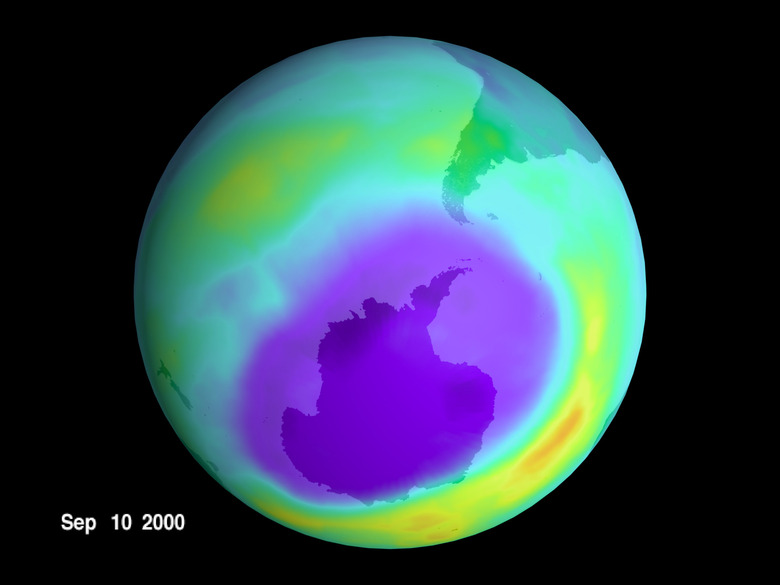What Percent Of UV Does The Ozone Absorb?
High in the stratosphere, about 32 kilometers (20 miles) above the Earth's surface, the conditions are just right to maintain a concentration of 8 parts per million of ozone. That's a good thing because that ozone strongly absorbs ultraviolet radiation that would otherwise create conditions inhospitable for life on Earth. The first step to understanding the importance of the ozone layer is to comprehend just how well ozone absorbs ultraviolet radiation.
The Ozone Layer
The Ozone Layer
Ozone is formed when a free oxygen atom collides with an oxygen molecule. It's a little more complicated than that because another molecule needs to be in the neighborhood to kind of push the ozone-forming reaction along. An oxygen molecule consists of two oxygen atoms, and an ozone molecule consists of three oxygen atoms.
Ozone molecules absorb ultraviolet radiation, and when they do they split up into a two-atom oxygen molecule and a free oxygen atom. When the air pressure is just right, the free oxygen will quickly find another oxygen molecule and make another ozone molecule.
At the altitude where the rate of ozone formation matches up with the rate of ultraviolet absorption, there is a stable ozone layer.
Ultraviolet Radiation
Ultraviolet Radiation
Ultraviolet, or UV, radiation is often called UV light because it's a form of electromagnetic radiation only slightly different than visible light. That slight difference is very important, though, because bundles of UV light contain more energy than visible light. The UV spectrum begins where the visible spectrum ends, with wavelengths around 400 nanometers (less than 400 billionths of a yard). The UV spectrum covers the wavelength region down to 100 nanometers. The shorter the wavelength, the higher the energy of the radiation. The UV spectrum is broken down into three regions, called UV-A, UV-B and UV-C. UV-A covers from 400 to 320 nanometers; UV-B continues down to 280 nanometers; UV-C contains the remainder, from 280 to 100 nanometers.
UV and Matter
UV and Matter
The interaction of light and matter is an exchange of energy. For example, an electron in an atom can have extra energy to get rid of. One way it can dump that extra energy is by emitting a tiny bundle of light called a photon. The energy of the photon matches the extra energy the electron gets rid of. It works the other way around, too. If the energy of a photon exactly matches the energy needed by an electron, the photon can donate that energy to the electron. If the photon has either too much or too little energy it won't be absorbed.
Ultraviolet light has more energy than radio, infrared or visible light. This means that some ultraviolet — especially the shorter wavelengths — have so much energy they can rip electrons away from their home atoms or molecules. That's a process called ionization, and it's why ultraviolet waves are dangerous: They ionize electrons and damage molecules. UV-C waves are the most dangerous, then comes UV-B and finally UV-A.
Ozone Absorption
Ozone Absorption
It turns out that the energy levels of electrons in the ozone molecule match the ultraviolet spectrum. Ozone absorbs more than 99 percent of UV-C rays — the most dangerous portion of the spectrum. Ozone absorbs about 90 percent of the UV-B rays — but the 10 percent that make it through are a big factor in inducing sunburns and triggering skin cancer. Ozone absorbs about 50 percent of the UV-A rays.
Those numbers are dependent upon the density of ozone in the atmosphere. Chlorofluorocarbon emissions change the balance of ozone creation and destruction, tilting it toward destruction and reducing the density of ozone in the stratosphere. If that trend were to continue indefinitely, NASA explains how serious the consequences would be: "Without ozone, the Sun's intense UV radiation would sterilize the Earth's surface."
References
Cite This Article
MLA
Gaughan, Richard. "What Percent Of UV Does The Ozone Absorb?" sciencing.com, https://www.sciencing.com/percent-uv-ozone-absorb-20509/. 24 April 2017.
APA
Gaughan, Richard. (2017, April 24). What Percent Of UV Does The Ozone Absorb?. sciencing.com. Retrieved from https://www.sciencing.com/percent-uv-ozone-absorb-20509/
Chicago
Gaughan, Richard. What Percent Of UV Does The Ozone Absorb? last modified March 24, 2022. https://www.sciencing.com/percent-uv-ozone-absorb-20509/
